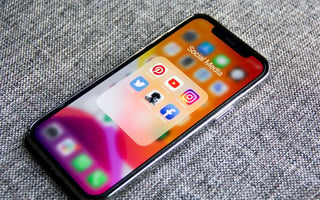Apologies. We’ve all seen plenty of them lately.
Another high-profile apology and another ‘sorry’ that falls some way short of the mark.
So many organisations and people in the media spotlight continue to offer ‘sorry, not sorry’ apologies.
The latest example came when Home Secretary Priti Patel issued what she described as an “unreserved, fulsome apology” after an internal investigation found her guilty of bullying.
Here is the key bit of what she said in her statement: “I am sorry that my behaviour in the past has upset people. It has never been my intention to cause upset to anyone.”
Does that sound “unreserved” and “fulsome”? There’s a big difference between saying “I am sorry for my behaviour” and “I am sorry that my behaviour in the past has upset people.”
And the unconvincing apology theme continued in her TV interviews.
She told BBC News: "I'm here to give an unreserved apology today and I am sorry if I have upset people in any way whatsoever.
"That was completely unintentional and I'll be very candid, you know the work that I do here in this department and across government is deeply challenging.
"So, if I have upset people, that has been completely unintentional, that was not my intention and I'm absolutely sorry for any upset that has been associated with that."
And talking to Sky News she said: "I've given an unreserved apology to anybody who has been upset by anything that has taken place."
Asked what behaviour she was apologising for, Ms Patel said: "If people felt upset by expressions of frustration specifically that has been highlighted by Alex Allan, I've been very clear about that, I've given an unreserved apology."
The problem with Ms Patel’s apologies are they are full of caveats, clauses and plenty of ‘ifs’. And it leaves you with the impression she is apologising because people were upset rather than her behaviour
Perhaps we shouldn’t be surprised by the nature of her apology given her track record.
Fronting a Downing Street press conference back in April, Ms Patel was asked twice if she would apologise for the lack of PPE available for frontline workers and replied by saying: “I’m sorry if people feel that there have been failings.”
And that resulted in online ridicule.
'I'm sorry if you feel you have died.'
— Houman Barekat (@HoumanBarekat) April 11, 2020
Me to my editor: I’m sorry if you feel that I still haven’t filed that draft you’re waiting for.
— Hannah Al-Othman (@HannahAlOthman) April 12, 2020
me to HMRC: I’m sorry if you feel like I haven’t submitted my self assessment
— Mollie Goodfellow (@hansmollman) April 12, 2020
But it is not just politicians who use these non-apology apologies.
Last year, for example, Puma found itself accused of glamourising drug culture in one of its campaigns. It said it regretted ‘any misunderstandings’ and added: “We apologise for any upset or offence caused in the usage of this language.”
The issue with this approach to apologising is that is doesn’t sound meaningful and it sidesteps responsibility.
Good apologies, whether they come from an individual or an organisation facing a crisis media management incident, reflect sincerity, honesty and empathy but they also take ownership for what has happened.
So, what do you need to do to make your apologies feel genuine? Here are some tips from our crisis communication courses.
Avoid ‘if’
It may only contain two letters, but ‘if’ packs a punch in an apology. And it suggests you are not convinced you have done anything wrong.
“If people felt upset”, “If I have upset people”, “if there are failings” – these phrases all detract from the believability of an apology.
And there is research to back this up.
A YouGov study found 60 per cent of those who took part believe “I am sorry for any offence caused” to be a proper apology – even though we would argue it is a poor effort.
But if you tweak it slightly to say “If my words caused offence, I apologise”, then only 38 per cent felt it was a real apology.
Avoid ‘for any’
You should also avoid the phrase ‘for any’. It is another way of implying you feel you may not have done or said anything wrong. And it can be seen as an attempt to play down the significance of what has happened.
It also just feels scripted and rehearsed.
Be human
One of the best ways to ensure apologies sound sincere is to adopt a human tone.
Ditch the corporate language. If the apology takes the form of a statement, make it sound like there is a person behind it rather than a collection of lawyers and advisers.
If it takes the form of a media interview, be brave and trust your spokespeople to put messaging in their own words.
The more human and natural an apology sounds, the more it will resonate.
Put the apology first
When an organisation feels it should apologise, ‘sorry’ should be the first thing it says in any statement or interview.
It shows that your customers are utmost in their thoughts, that they understand the severity of what has happened and the impact it has had.
There was a good example of this last year when Contently found itself in the firing line after announcing that it was going to charge its freelance contributors a 4.75 per cent fee for them to get paid.
Its apology, from CEO Joe Colman, began with the simple, yet powerful “I’m sorry”.
Be specific
If you look back at Ms Patel’s apologies, it is notable the Sky News reporter pushed her on what she was actually apologising for.
The best apologies are specific. They acknowledge what the problem is, rather than talk around it or attempt to play it down, no matter how uncomfortable it may feel.
Don’t offer excuses
The Home Secretary has said there were “no excuses”, but also said that “I'll be very candid, you know the work that I do here in this department and across government is deeply challenging” – some may see that as an explanation and others as an excuse.
And there is a thin line between explanation and excuse.
But any hint of an excuse can weaken apology and be seen as an attempt to remove some responsibility.
Media First are media and communications training specialists with over 35 years of experience. We have a team of trainers, each with decades of experience working as journalists, presenters, communications coaches and media trainers.
Subscribe here to be among the first to receive our blogs.




